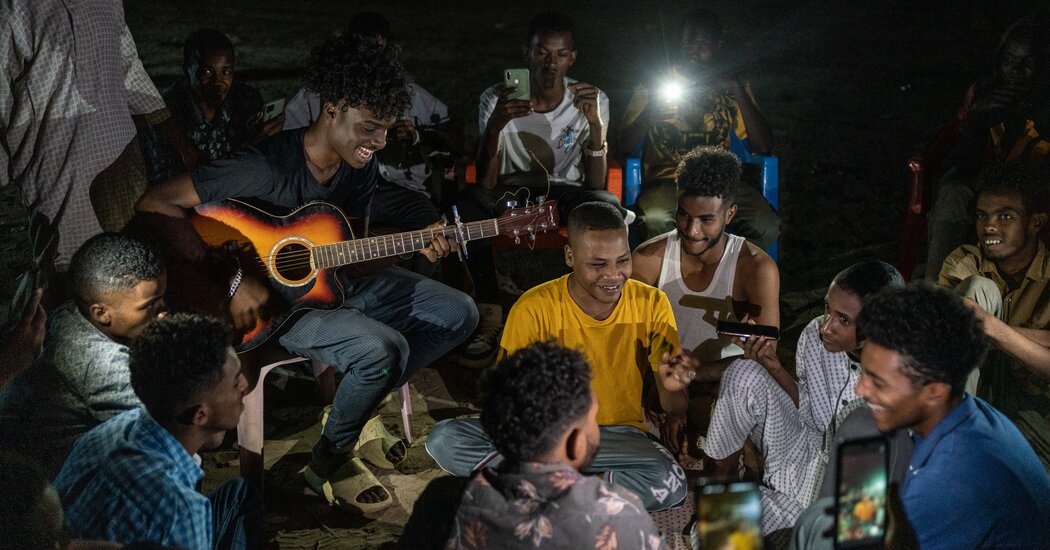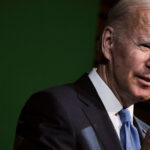
KHARTOUM, Sudan — Friday night by the Nile, and a love song wafted on the warm breeze that blew across Tuti Island, a crescent of land at the confluence of the river’s two great branches.
Hundreds of people had gathered on the beach for iftar, the sunset meal that breaks the daily fast during the Islamic holy month of Ramadan. Once they had eaten, there was a palpable sense of relief.
People lounged in the sand, smoking cigarettes and scrolling on their screens. Children splashed in the river shallows. Kites danced in the sky. While the Sudanese capital twinkled on the far shore, a young crooner struck up a song.
“How could your heart allow you to forget me?” sang Ibrahim Fakhreldin, his face bathed in the glow of cellphones held by his friends, who erupted for the chorus.
“Tell us what changed, for the sake of love,” they sang in unison, some playfully clutching their hearts, in a rendition of “Now You Just Pass Us By,” a traditional Sudanese ballad.
The song was personal for Mr. Fakhreldin, 20, who told me that he had once courted a girlfriend on this beach. “It’s over,” he said wistfully. “But the place is still here.” Now he had come in search of something else — a respite from the daily grind of Sudan, where a once-glorious revolution has run badly aground, and the heady hopes that it once inspired are crumbling.
“We come here to forget it all,” said Mr. Fakhreldin, who described himself as a disillusioned revolutionary. “The heat, the electricity cuts, the protests. Here, at least we can sing.”
For those who are fasting, iftar is a daily deliverance after the long hours of hunger and thirst. In Sudan it is particularly trying: Daytime temperatures are regularly hitting 115 degrees Fahrenheit, around 45 degrees Celsius, these days, and the power cuts can last eight hours.
An ominous political backdrop sharpens the privation. A military coup last October scuttled the democratic transition that started in April 2019 when crowds toppled Omar Hassan al-Bashir, their autocratic ruler for 30 years. Now the economy is tanking, food prices are soaring, and nearly 100 people have been killed in anti-military demonstrations.
But Ramadan is also a time of community, when friends, families and even strangers come together to break their fast. The iftar meal, which over several weeks I was invited to share in riverside villages, desert huts and suburban streets, also offered a cherished pause — a chance to take stock at a moment when many say that Sudan is drifting perilously, leaving them uncertain what comes next.
As we drove back to Khartoum one evening, we suddenly came on a group of determined-looking men standing in the middle of the road, urging us to stop. But this wasn’t a stickup. It was dinner.
The Celebration of Ramadan
The Muslim monthlong holiday of Ramadan, a time of prayer, fasting and feasting, began in the United States on April 2.
A long mat lined with food platters was at the gates of a small mansion in the town of El-Kabashi. About 50 other travelers were already seated, waiting to eat. The free meal — an iftar for passing travelers — was financed by Hasoba el-Kabashi, a local entrepreneur and the owner of the mansion.
Mr. el-Kabashi told me he made his fortune in real estate, car dealerships and a cargo business in Dubai. Now he was paying it back. This was a small crowd, he remarked; he once fed six busloads of travelers. There was no question of anyone paying a cent.
“It’s for God,” he said, pointing to the sky now filling with stars.
His guests didn’t stand on ceremony. After 15 minutes they rose from the meal, offered communal prayers, and continued on their journeys. So did we.
With the road empty, we raced into central Khartoum, crossing the Nile on a century-old bascule bridge then swooping past the gates of the military headquarters where demonstrators massed to oust Mr. al-Bashir in 2019, in euphoric scenes that stoked hopes that this revolution could endure.
But now the square is a ghostly arena. Soldiers manned check posts on deserted streets. The celebrated revolutionary murals had been painted over. Just a few scraps of defiant graffiti remained. “We were killed here,” read one.
Further downriver, at the Chinese-built presidential palace, I met with Lt. Gen. Ibrahim Gabir, one of the generals now running the country. The military’s intervention last October was not a coup, he insisted. “I prefer to say redirection,” he said.
Over an hour of conversation, General Gabir blamed Sudan’s mess on its squabbling politicians and promised to hold elections by July 2023 — an impossibly short timetable to hold a free and fair vote, by most estimates.
It was nearly time for iftar. Leaving, I meandered through the long corridors of the empty palace. A painting depicted Mohammed Ahmed Ibn el-Sayyid Abdullah, a messianic 19th-century religious leader who led a revolt against British colonialism, trampling an enemy combatant under his horse. But when I finally found the exit, General Gabir was already there, jumping into a vehicle, scrambling home to break his fast.
The traditional iftar meal in Sudan includes rich meat sauces soaked up with kisra sorghum crepes, spicy beef sausages, bean stews and glistening chunks of watermelon. The food is washed down with seasonal drinks — karkade, or iced hibiscus juice, and a local sweet-and-sour beverage known as abreh. But for many Sudanese, these have become unaffordable luxuries.
At a sweltering bakery in Atbara, 175 miles from Khartoum, young men tossed flatbreads from an open oven that were sold for 50 Sudanese pounds, or about nine cents, each. Three years ago, they cost 2 pounds each. That’s a resonant issue in Atbara, where student protests over soaring bread prices in late 2018 triggered the countrywide movement that eventually toppled Mr. al-Bashir. But the appetite for revolution has diminished.
“I don’t care anymore,” said Kultom Altijani, a 45-year-old street vendor who appealed for money to send her ailing daughter to a dentist. “We want to eat and drink — that’s it.”
Years after Mr. al-Bashir’s ouster, his allies are still faring better than most, and slowly making a comeback. This Ramadan, the wealthier officials can be found among the evening crowd at the Al Salam hotel, the salon of the Khartoum elite. Although the iftar buffet costs $45 per head, it is packed every evening, with women in finely embroidered gowns sitting beside men in immaculate robes. They rub shoulders with assorted foreigners looking to solve, or profit from, Sudan’s political mess — diplomatic envoys, Russian mercenaries, aid workers and United Nations officials.
Iftar is also laden with meaning for the revolutionaries who fight on. On April 6, demonstrators filled the street outside the Al Salam to mark the third anniversary of Mr. al-Bashir’s ouster. This time the warm breeze didn’t carry a love song, but a sting.
Thick smoke billowed from burning tires as young men and women, seasoned by months of protest, clashed with riot police. At the front, some protesters wore ski masks and garden gloves they used to hurl streaming tear gas canisters back at the police.
Even though I hung back, my eyes stung from the clouds of tear gas that drifted down the street, and I stumbled to the roadside. The call of the muezzin rang out: iftar.
The chanting abated and bags of food were produced. Protesters passed around dates, sandwiches and paper cups filled with karkade. A woman wrapped in a Sudanese flag offered to share her food and, seeing my state, offered a vinegar-soaked cloth to stop the tears.
Others crouched on the curb, chugging water and savoring a moment of relief, as yet more tear gas pop-popped in the distance.




